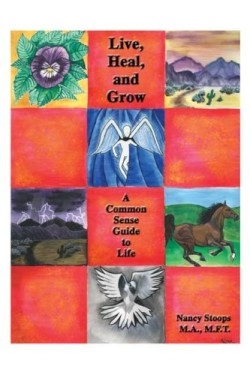Live Heal and Grow
A Common Sense Guide to Life
“The truth is there is no easy way to heal from what life brings our way. It takes a lot of effort and time to work through our pain” Nancy Stoops writes. “There are no short cuts or surefire methods…Healing can feel very lonely and scary at times.” The author hopes that her book will encourage those who are facing loss who feel themselves alone with their pain and think that they will never again feel happiness. Her desire is to show others that they are not alone in their suffering and that there is help even for those who feel such grief and sorrow that they no longer wish to live.
Although trained and licensed as a Marriage and Family Therapist Stoops’ message comes from one who is more than that—she is herself a survivor. While still a young woman she suffered the devastating loss of most of her family losing one brother to suicide another to murder and her dearly loved father to pancreatic cancer. She helped care for her father in his illness and helped him prepare to die. She comforted her mother alone after so many years of marriage to a good man and her son who had lost his grandfather. Through it all she wondered why she was the sole survivor of all her mother’s children and had to confront the feeling almost overwhelming at times that she had no right to live. She also experienced the pain of divorce and the difficulties of raising a child alone.
Her message is one of hope and courage calling readers to embrace life even in the midst of their most difficult situations. In a friendly non-clinical style Stoops challenges readers to engage in a dialogue with their inner selves and to respect the information that dialogue brings forth. Questions and exercises designed to help readers thoughtfully engage the issues are found at the end of each chapter.
Stoops advocates thankfulness and making the choice to focus on what is right with one’s life; sharing her personal experiences and the wisdom she has gained from them she warns readers that no one knows how long or short one’s life will be; no one knows when it will be their last chance to tell someone “I love you.” Stoops asks the question to which all such experience leads: Why is it that most people only discover and begin to pay attention to what is most important to them when they find out that someone they love or they themselves may have only a short time left to live? She encourages living “like there is no tomorrow” reaching out to others who are in need asking for help when one needs it and saying and doing in the present the meaningful things that demonstrate the love one has for others and for oneself.
Disclosure: This article is not an endorsement, but a review. The publisher of this book provided free copies of the book and paid a small fee to have their book reviewed by a professional reviewer. Foreword Reviews and Clarion Reviews make no guarantee that the publisher will receive a positive review. Foreword Magazine, Inc. is disclosing this in accordance with the Federal Trade Commission’s 16 CFR, Part 255.

